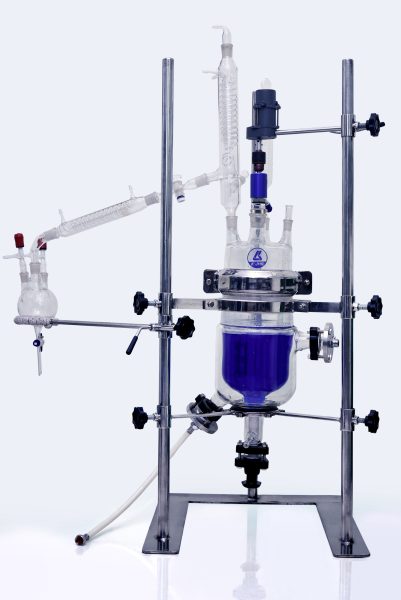
When it comes to the chemical and pharmaceutical industries, precision and reliability are paramount. One essential piece of equipment that embodies these qualities is the jacketed glass reactor. But have you ever wondered why the quality of the material used in these reactors is so crucial? Let’s dive into the significance of material quality in jacketed glass reactors and why companies like K-Jhil Scientific are at the forefront of manufacturing these critical systems.
Introduction
Imagine trying to bake a perfect cake in a faulty oven. The results would be inconsistent, and you might end up wasting ingredients. This analogy perfectly mirrors the importance of using high-quality materials in jacketed glass reactors. In the chemical and pharmaceutical industries, where precision is everything, the materials used in these reactors can make or break the outcome of a reaction.
What is a Jacketed Glass Reactor?
A jacketed glass reactor is a vessel designed for mixing, dissolving, and performing chemical reactions under controlled temperature conditions. The “jacket” refers to an outer layer that allows for the circulation of a heating or cooling fluid, maintaining the desired temperature inside the reactor.
Key Components of a Jacketed Glass Reactor
1. Reactor Vessel
The core component where the chemical reaction occurs. It’s typically made from borosilicate glass due to its durability and resistance to thermal shock.
2. Jacket
The outer layer that surrounds the reactor vessel. This jacket facilitates the circulation of heating or cooling fluids to control the temperature of the reaction mixture.
3. Stirrer and Motor
These components ensure that the reaction mixture is evenly mixed, promoting uniform reactions.
4. Ports and Valves
These allow for the addition of reactants, removal of products, and sampling of the reaction mixture without disrupting the process.
Why Material Quality Matters
Durability and Longevity
High-quality materials ensure that jacketed glass reactors can withstand the harsh conditions often present in chemical reactions, such as extreme temperatures and corrosive substances. This durability translates into longer equipment life and reduced maintenance costs.
Safety
Using inferior materials can lead to equipment failure, posing significant safety risks. High-quality glass, reduces the likelihood of breakage and chemical spills, protecting both personnel and the environment.
Precision
The chemical and pharmaceutical industries demand precision. High-quality materials ensure consistent thermal conductivity and chemical resistance, leading to more reliable and reproducible results.
Types of Glass Used in Reactors
Borosilicate Glass
The most common type of glass used in jacketed glass reactor vessels. It’s known for its excellent thermal resistance and chemical stability.
Quartz Glass
While more expensive, quartz glass offers superior thermal properties and is used in specialized applications where extreme temperatures are involved.
Advantages of High-Quality Glass
Thermal Stability
High-quality glass can withstand rapid temperature changes without cracking, which is crucial for processes requiring precise thermal control.
Chemical Resistance
Using chemically inert glass prevents reactions between the reactor material and the reactants, ensuring the purity of the chemical process.
Transparency
Clear, high-quality glass allows for easy monitoring of the reaction, enabling operators to make adjustments in real-time.
The Role of the Jacket in a Jacketed Glass Reactor
The jacket in a double jacketed glass reactor serves as a thermal barrier that regulates the temperature of the reaction mixture. By circulating heating or cooling fluids through the jacket, operators can maintain the reaction at the desired temperature, which is critical for optimizing reaction rates and yields.
Impact on Chemical Reactions
The quality of the materials used in jacketed glass reactors directly impacts the efficiency and success of chemical reactions. High-quality glass ensures uniform temperature distribution, minimizes the risk of contamination, and enhances the reproducibility of results.
Safety Considerations
Minimizing Risks
Using high-quality materials reduces the risk of equipment failure and accidents. This is particularly important in the chemical and pharmaceutical industries, where safety is a top priority.
Compliance with Standards
High-quality jacketed glass reactor vessels comply with industry standards and regulations, ensuring safe and reliable operation.
Maintenance and Longevity
Reduced Downtime
High-quality materials result in fewer breakdowns and maintenance issues, leading to reduced downtime and increased productivity.
Cost-Effectiveness
Although high-quality jacketed glass reactors might have a higher initial cost, their durability and low maintenance requirements make them a cost-effective choice in the long run.
K-Jhil Scientific’s Contribution
K-Jhil Scientific is renowned for its commitment to quality in manufacturing chemical process systems. Their jacketed glass reactors are made from the finest materials, ensuring superior performance, safety, and reliability. By prioritizing material quality, It helps industries achieve their goals efficiently and safely.
Cost vs. Quality: A Worthy Investment
Investing in high-quality jacketed glass reactors is akin to buying a reliable car. The initial cost may be higher, but the benefits of longevity, safety, and performance far outweigh the expenses. Companies that prioritize quality over cost often see better returns on their investments in the long term.
Environmental and Economic Benefits
Sustainability
High-quality materials contribute to the sustainability of chemical processes by reducing waste and improving energy efficiency. Durable reactors mean less frequent replacements and lower environmental impact.
Economic Efficiency
Investing in quality reduces the need for frequent repairs and replacements, leading to cost savings over time. Efficient reactors also enhance productivity, contributing to economic growth.
Future Trends in Jacketed Glass Reactors
Smart Reactors
The integration of smart technology into jacketed glass reactors is a growing trend. Smart reactors equipped with sensors and automated controls enhance precision and efficiency, paving the way for advancements in chemical and pharmaceutical processes.
Advanced Materials
Ongoing research into advanced materials promises to further improve the performance and durability of jacketed glass reactors. Innovations in glass composition and manufacturing techniques will likely lead to even better reactors in the future.
Conclusion
The quality of materials used in jacketed glass reactors is not just a detail—it’s a cornerstone of successful chemical and pharmaceutical processes. From ensuring safety and precision to enhancing durability and economic efficiency, high-quality materials make all the difference. Companies like K-Jhil Scientific exemplify the importance of prioritizing quality in the manufacturing of these vital systems.
